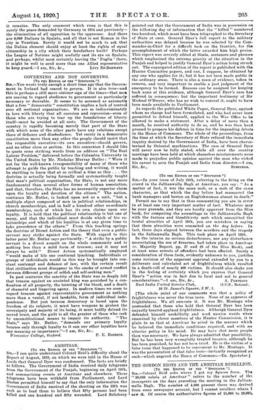AMRITSAR.
[To THE EDITOR OP THE " SPECTATOR."] SIR,—I can quite understand Colonel Reid's difficulty about the Report of August, 1919, on which we were told in the House of Lords that General Dyer was condemned. The facts are briefly as follows. The Government of India received daily telegrams from the Government of the Punjab, beginning on April 14th, and summarizing events at Amritsar and elsewhere. These telegrams have been withheld from Parliament, and Lord Meston permitted himself to say that the only information the Government of India received of the shooting on the 13th was such as to lead them to believe that fifty persons had been killed and one hundred and fifty wounded. Lord SalisbUry pointed out that the Government of India was in possession on the following day of information that the " killed " numbered two hundred, which must have been telegraphed to the Secretary of State at once. General Dyer's full report to the military authorities was delayed because ho was selected by the Com- mander-in-Chief for a difficult task on the frontier, for the accomplishment of which the latter awarded him high praise. This report was severely edited at Simla, sentences and phrases which emphasized the extreme gravity of the situation in the Punjab and helped to justify General Dyer's action being struck out. The expurgated edition of the report is published with the Hunter Committee papers, and can, I suppose, be obtained by any one who applies for it; but it has not been made public in the ordinary sense. There is also a mass of evidence, taken in camera, and very important to enable a just judgment of the emergency to be formed. Reasons can be assigned for keeping back some of this evidence, although General Dyer's case has suffered in consequence; but the important testimony of Sir Michael O'Dwyer, who has no wish to conceal it, ought to have been made available to Parliament.
As regards the published White Paper, General Dyer, against whom no charge had been formulated, and who had never been permitted to defend himself, applied to the War Office to be allowed to make a statement. After a delay of more than a month, he received authority to do so, and he was then hard pressed to prepare his defence in time for the impending debate in the House of Commons. The whole of the proceedings, from the time at which the Secretary of State refused the immediate inquiry desired by the Government of India, have been charac- terized by Oriental machinations. The ease of General Dyer will never now be fully stated, while all over the country meetings have been held at which shameless misstatements were made to prejudice public opinion against the man who risked his career to save the Punjab and India from disaster.—I am.


































 Previous page
Previous page